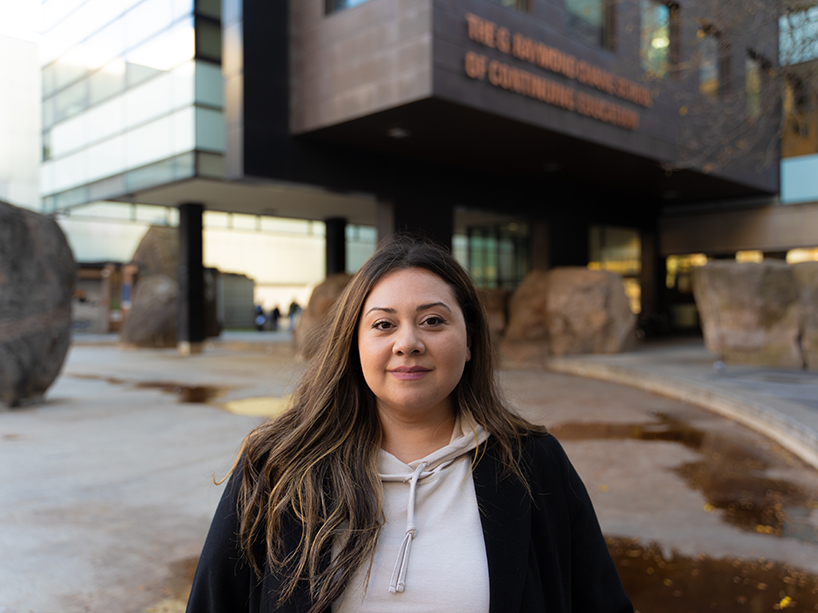Spanning the Gaps offers life-transforming pathways to higher education

Spanning the Gaps program recognizes and addresses the issue of unequal access to higher education, offering life-tranforming pathways to post-secondary studies. Photo: Polina Tankilevitch via Pexels
Dare to dream. This is the hope offered by the Spanning the Gaps – Access to Post-Secondary Education program to those who seek equal opportunity of access to higher education. This month marks 15 years that the program has been breaking down barriers to university access, a milestone that is punctuated by ambitions to expand nationally.
The power of education to transform lives
Education provides a foundation for prosperity and has the power to break cycles of intergenerational poverty and social exclusion by offering increased employment opportunities, earning potential and improved living standards.
“Fifteen is an amazing milestone,” says Paula Green, Spanning the Gaps program director, community engagement, at The Chang School of Continuing Education. “Having more than 455 graduates who have come through the program, and who have gone on to successfully complete post-secondary degrees and other credentials, makes us feel quite proud of the work we do.”

First-year psychology student Carla Blanco successfully completed the Spanning the Gaps bridging program offered through the G. Raymond Chang School of Continuing Education as a way to access post-secondary education and realize her dreams. Photo: Jaye Huynh
“They're gonna help you get into university, prepare you and teach you the skills that you need to succeed? This is perfect. This is exactly what I need.” - Spanning the Gaps alum and first-year psychology undergraduate student Carla Blanco
For Carla Blanco, the hope offered by Spanning the Gaps allowed her to reimagine her future and take control of her life. As a result of some personal issues during high school, Blanca’s grades fell short of post-secondary eligibility. Out of school, she started a family and entered the working world, mostly lower-paying retail jobs, which kept her busy for the next 16 years. It was during a difficult time in the pandemic that she found herself listening to podcasts, reading books and researching topics in psychology.
“I realized I'm really interested in this. I wish I could go back to school,” Blanco recalls. This renewed interest prompted her to search options at TMU where she came across the program and remembers thinking, “It just sounded too good to be true”.
The program allowed her to test the waters with university-level courses and provided mentoring, tutoring, guidance and feedback on projects. She also received financial support in the form of awards and scholarships from the program to cover the costs.
In September, Blanco started the first year of a psychology degree at TMU and is doing well in her classes. “I'm just really, really happy that I did this.”
World Access to Higher Education Day
This month’s anniversary coincides with the World Access to Higher Education Day (external link) (WAHED) on November 17th. Toronto Metropolitan University (TMU) is a supporter of the global network dedicated to equity in access to higher education. The international initiative, established by the United Nations Educational, Scientific and Cultural Organization (external link) (UNESCO), is informed by a broader acknowledgement that access to higher education is both a public good and a human right (external link) .
Increasing student representation in higher education
By offering pathways to a selection of TMU degree programs, the university helps remove barriers to access and increases student representation from equity groups. This includes building relationships with grassroots organizations that serve underrepresented communities.
“Over the last 15 years we’ve been able to create meaningful partnerships with different community organizations to create awareness about our access to education program,” says Spanning the Gaps manager, Elisa Traficante. “We are currently developing a program partnership with Covenant House which supports youth with precarious housing. And in the past, we've worked with groups like The Immigrant Women Integration Program (IWIP), providing women newcomers with access to educational resources.”
Renewed commitment for widening access to university
Spanning the Gaps will continue inspiring dreams and fueling ambitions as it looks towards the future.
Program goals include removing even more barriers by providing support to meet mature student eligibility criteria for the program (like offering a selection of courses to meet admission requirements). Another goal is offering support to address non-academic barriers such as mental health challenges, housing precarity and financial impediments.
The program will also make a more determined effort to engage Indigenous communities. “We want to deepen our partnership with TMU’s Aboriginal Student Services and create more in-depth programming for Indigenous students, as well as reach out to Indigenous communities in the far and near North,” says Traficante.
By offering more online options, the program has been able to reach remote Indigenous communities, work that is ongoing says Green.
This strategic direction towards programming for racialized communities will also include a focus on engaging Black students.
“We want to create programming that meets the specific needs of the students that we're serving. Part of that will be going into the community with open ears and co-creating opportunities together,” says Traficante.
Measurable and immeasurable impacts
More than 2,000 adults have found meaningful careers and transformed their lives as a result of the Spanning the Gaps program, unlocking potential and expanding future possibilities.
By supporting academic as well as socio-economic needs, the program makes higher education not just possible but doable.
Green points out the less tangible outcomes associated with this program including an increased sense of confidence and the chance to connect to a community of like-minded mature students who have all faced barriers to education in some form. The program empowers students and builds resilience, preparing them for an increasingly complex, uncertain and precarious world.
“We want to make sure that at the end of the day, whatever crisis or challenge our students are faced with, that they know we are here to support them through it,” says Green. “We believe firmly that their success is possible and we’re championing them every step of the way.”
Related story: